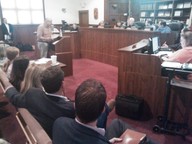 Southern Company’s subsidiaries are all turning to the sun!
Even that titanic ship is affected by the tugboats of its corporate customers.
Southern Company’s subsidiaries are all turning to the sun!
Even that titanic ship is affected by the tugboats of its corporate customers.
Ari Phillips, ClimateProgress, 16 July 2015, This Massive Utility Wants More Renewable Energy Because Corporations Are Demanding It,
In June, Alabama Power, one of the country’s largest electricity providers, filed a petition with the state’s Public Service Commission to add up to 500 megawatts of renewable energy over the next six years. The utility, which serves over 1.4 million customers in Alabama, cited customer demand as a primary reason for adding all this renewable energy — specifically corporate customers.
“This program was driven by conversations with customers looking to meet renewable mandates pushed down from their headquarters,” said Tony Smoke, Alabama Power vice president of marketing, in a statement announcing the request. “As a service provider, our focus is to make sure we are providing customers access to choices they want.”
It’s like Southern Company CEO Tom Fanning said in May Continue reading





